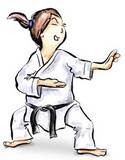 I try to spend the mornings after karate class writing down specifics about techniques and recapping what we learned or reviewed the previous night. Before I did that this morning, I reviewed new posts from my favorite martial arts bloggers and found a great post on "Honoring Technique" from my "across the pond" MA friend, Sue. Great minds think alike, I guess...
I try to spend the mornings after karate class writing down specifics about techniques and recapping what we learned or reviewed the previous night. Before I did that this morning, I reviewed new posts from my favorite martial arts bloggers and found a great post on "Honoring Technique" from my "across the pond" MA friend, Sue. Great minds think alike, I guess...Last night when I was visiting the dojo that meets on campus after my editing class, I ran into my own "honoring technique" situation when I was asked to help the underbelts with Ippon Kumite (one-point sparring) techniques. The group has a grading coming up later this week and the class was one of the last fine-tuning opportunities they'll have before promotions. There were only two women there - a seventh kyu and a fifth kyu. Close in rank, height and weight, they paired up and worked on their ippons together.
It became quickly apparent, though, that the two of them were just sort of falling to the ground when they were the uke (person having the technique done to them) and pulling techniques/punching past each other when they were the nage or tori (person doing the technique). I could see that they knew what they were supposed to be doing, but whether or not they could do it effectively in "real time" wasn't so obvious.
My mention of it to the sensei led to a discussion about appropriate resistance. Sure the uke needs to offer some resistance, but too much can make executing the technique almost impossible. But how much is too much for a white belt? For a green belt? I remembered one of my early promotions with my green belt uke who absolutely refused to be swept or taken to the ground. One of the senseis I'd been training with whispered to me to give Mr. Iron Man a gentle but firm push with my foot on the back of his knee to assist gravity a bit. Worked like a charm (he literally dropped like a rock), but I remember feeling kinda of surprised that I wasn't able to work the technique as I'd learned it for squat. Strange - because my uke in the dojo always fell right on cue. Hmmm...
It seems to me that we do each other a terrible dis-service by just falling to the ground when a punch comes into our vicinity. If I totally lose my balance when my tori simply touches my gi, it may give a false sense that the technique he/she is doing is actually working when in fact it might not be. Especially for women and others who may be faced someday with an evil-doer who is bigger and stronger, learning how to make the techniques as effective as possible is absolutely key - but not just so it looks good for grading. I think it's best to begin learning that as the technique is being learned. Because I've been there, done that, the idea of learning something one way then having to re-learn it so it works whenever you need it to is not the best way to grasp a concept, I'm thinking. The "it will make sense/get easier as you develop and grow" school of thought is totally to the curb when it comes to learning karate, in my humble opinion.
But that's not to say that there aren't techniques in our system that I didn't have difficulty learning or that would ever be my "go-to" ones in a real, live situation - especially if my adversary is bigger than I am. To try to understand how that might play out, I tend to seek out the solid guys with the strong hands when working self-defense and wrist grab escapes (thanks to Sensei J, Rob, Mike and Ed for indulging me :-). If I can't make it work with them when they know what's coming, chances are I'm probably going to have issues making them flow smoothly in the street against Chester the Molester, too.
I'm going to channel Sue here (who asked the same question of her readers): what does "honoring technique" mean to you?
Hi Felicia, thanks for the mention. I suspect this is a common problem in many dojos. Perhaps all dojos should give more attention to teaching the roles and responsibilities of uke? It seems to be assumed that people will automatically know how to be a good uke but clearly they don't!
ReplyDeleteI'm not quite sure what the answer is, Sue. Perhaps remedial lessons on how to be an uke would work, but there is barely enough time to fit kata, kihon, kumite and self-defense techiniques in as it is. But some mention of it as partner techniques are first being learned/introduced might be an idea.
ReplyDeleteStuff sure isn't easy, is it?!?
Excellent discussion Felicia and Sue.
ReplyDeleteIt is a timely post. Last week, the class instructors were discussing appropriate resistance in reference to bunkai.
When I was training for shodan, I had a training partner with an iron grip. He was a big guy and would always make sure that I could make the technique work. Too bad he stopped training after black belt. I will always appreciate his help.
Hi, Michele...
ReplyDeleteMy shodan prep training partner had big hands, too. He was very helpful when it came to ippons and aiki jitsu techniques because he would only let go or fall if I applied the technique correctly. Thankfully, we still train together two to three times a week. I totally know what you mean about appreciating the assistance...